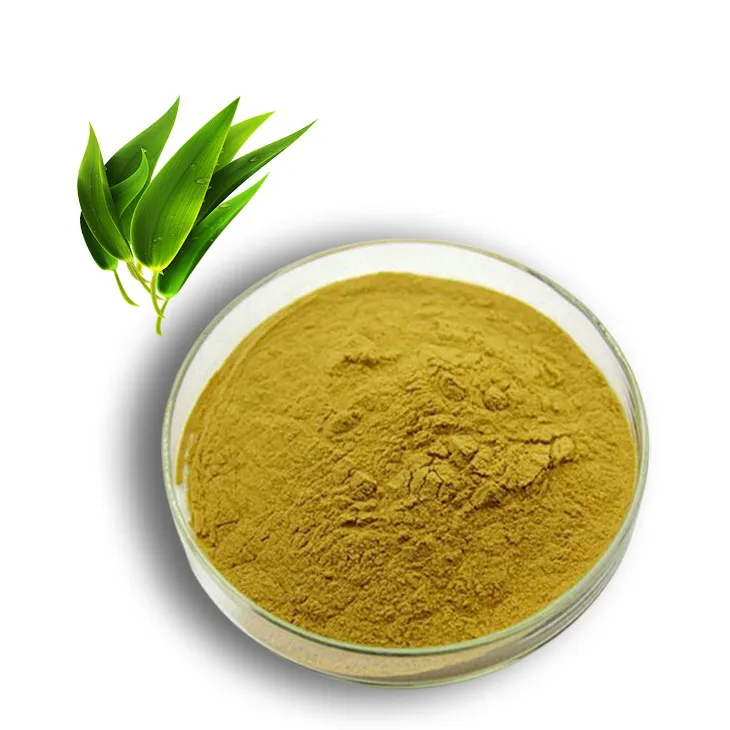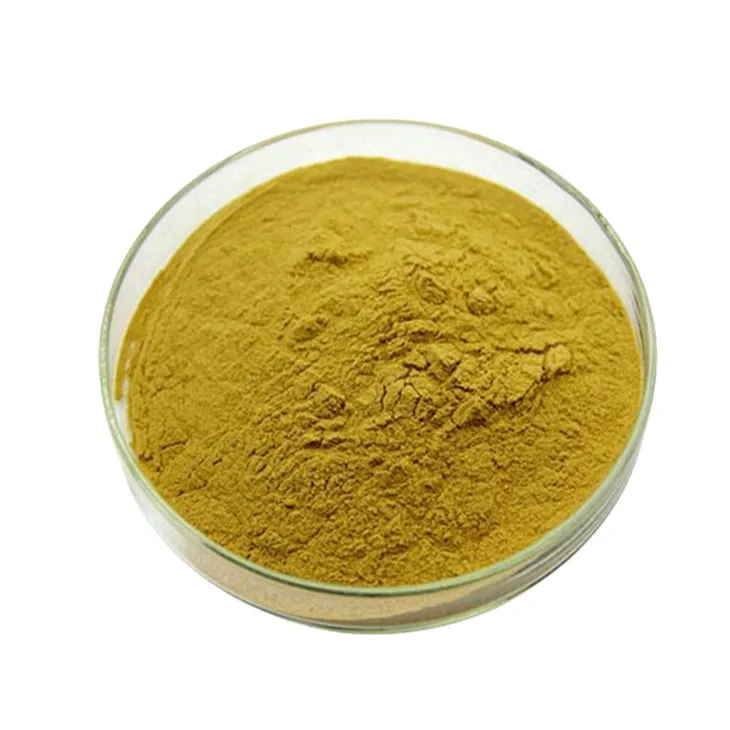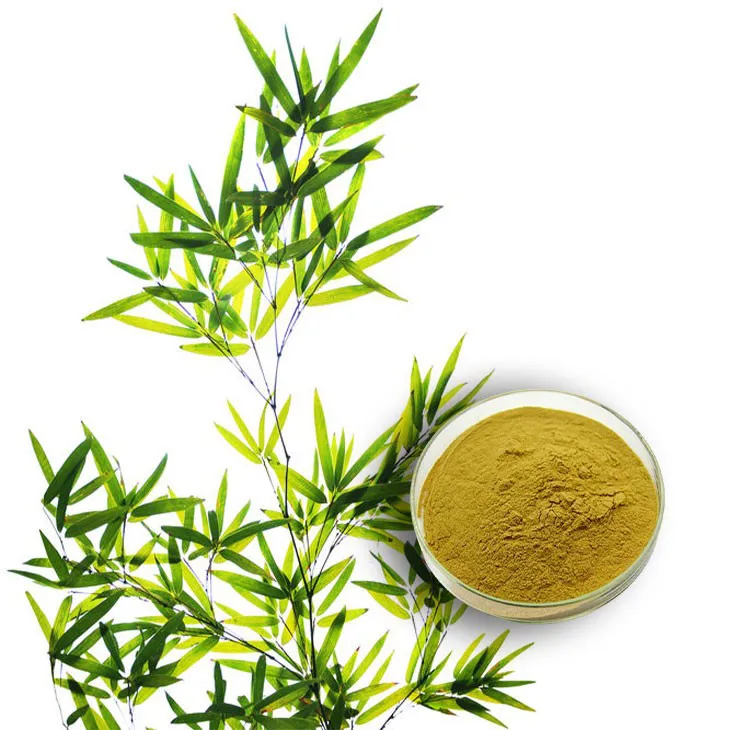- 0086-571-85302990
- sales@greenskybio.com
Seven Trends of Bamboo Leaf Extract.
2024-12-10

1. Application in the Food and Beverage Industry
Bamboo Leaf extract has emerged as a valuable ingredient in the food and beverage industry. Natural Flavoring is one of its significant contributions. It imparts a unique, fresh, and slightly grassy flavor to various products. For example, in some herbal teas, the addition of Bamboo Leaf extract enhances the overall taste profile, providing a more complex and refreshing flavor experience.
Moreover, Bamboo Leaf extract is recognized for its health - promoting properties in this context. It is rich in antioxidants such as flavonoids. These antioxidants can help in reducing oxidative stress in the body. In functional beverages, like certain sports drinks or energy drinks, the presence of bamboo leaf extract can be marketed as a natural way to boost the immune system and provide overall health benefits. Additionally, in some food products, it can act as a natural preservative due to its antimicrobial properties.

2. Role in the Pharmaceutical Field
The pharmaceutical field has shown great interest in bamboo leaf extract as a potential source of bioactive compounds. These bioactive compounds have the potential to be developed into new drugs or used as complementary therapies.
Studies have indicated that certain components in bamboo leaf extract may have anti - inflammatory properties. Inflammation is a key factor in many diseases, including chronic ones like arthritis. By targeting inflammation, bamboo leaf extract components could potentially be used in the development of new anti - inflammatory medications. Moreover, there is evidence suggesting that it may have anti - cancer properties. Some compounds in the extract have been shown to interfere with cancer cell growth and proliferation in pre - clinical studies. However, more research is needed to fully understand and develop these potential pharmaceutical applications.

3. Trends in Cosmetics for Skin - Care Benefits
In the cosmetics industry, bamboo leaf extract is becoming increasingly popular for its skin - care benefits. One of the main advantages is its antioxidant content. Antioxidants play a crucial role in protecting the skin from damage caused by free radicals. Free radicals are unstable molecules that can cause premature aging, wrinkles, and dull skin.
Bamboo leaf extract can also have a moisturizing effect on the skin. It helps to maintain the skin's hydration levels, making it look more supple and healthy. Additionally, it may have anti - microbial properties that can be beneficial for treating acne - prone skin. Some cosmetic products, such as face creams, serums, and masks, are now incorporating bamboo leaf extract as a key ingredient to offer these skin - care benefits to consumers.

4. Contribution to Environmental Protection for Sustainable Development
Bamboo is a highly sustainable plant, and the extraction of bamboo leaf extract also aligns with the principles of sustainable development in environmental protection.
Bamboo grows rapidly and requires relatively less water and land compared to many other plants. The extraction process can be designed in an environmentally friendly way. For example, the waste from the extraction can be recycled or used for other purposes such as composting. Moreover, the use of bamboo leaf extract in various industries can reduce the reliance on less sustainable raw materials. In the packaging industry, for instance, if bamboo leaf extract - based coatings can be developed for biodegradable packaging, it would contribute to reducing plastic waste and promoting a more sustainable environment.

5. Agricultural Use for Plant Growth Promotion
Bamboo leaf extract has shown potential in agricultural use for plant growth promotion. It contains various nutrients and bioactive substances that can benefit plants.
One of the ways it promotes plant growth is by enhancing the soil quality. When added to the soil, it can improve soil structure and fertility. It may also stimulate the growth of beneficial microorganisms in the soil, which in turn can help plants absorb nutrients more efficiently. Additionally, bamboo leaf extract has been found to have a positive impact on plant resistance to pests and diseases. Some studies have shown that plants treated with bamboo leaf extract are more resistant to certain fungal and bacterial infections, reducing the need for chemical pesticides in agriculture.
6. Research of New Chemical Constituents
There is an ongoing trend in the research of new chemical constituents in bamboo leaf extract. Scientists are constantly exploring the chemical makeup of bamboo leaf extract to discover new compounds with potential applications.
Advanced analytical techniques, such as high - performance liquid chromatography (HPLC) and mass spectrometry (MS), are being used to identify and isolate new chemical constituents. These new compounds may have unique biological activities that could open up new areas of application. For example, a newly discovered compound may have stronger antioxidant or anti - microbial properties than the known components in the extract. This research not only expands our understanding of bamboo leaf extract but also provides a basis for further development in various industries.
7. International Trade
The international trade of bamboo leaf extract is on the rise. As more countries recognize its potential in different industries, the demand for bamboo leaf extract in the international market is increasing.
China, as one of the major producers of bamboo, has a significant role in the international trade of bamboo leaf extract. Other countries are also starting to explore the cultivation of bamboo for extract production. However, there are challenges in international trade, such as standardization of quality and regulations. Different countries may have different requirements for the safety and quality of bamboo leaf extract. To promote international trade, efforts are being made to establish international standards for the production, extraction, and quality control of bamboo leaf extract.
In conclusion, bamboo leaf extract has a wide range of potential applications and development directions. The seven trends discussed above highlight its significance in various fields. As research continues and industries develop, we can expect to see even more innovative uses and growth in the market for bamboo leaf extract.
FAQ:
What are the applications of bamboo leaf extract in the food and beverage industry?
Bamboo leaf extract is used in the food and beverage industry for natural flavoring. It also has health - promoting properties, such as antioxidant and anti - inflammatory effects, which can be added to various products to enhance their nutritional value.
How can bamboo leaf extract be used in the pharmaceutical field?
In the pharmaceutical field, bamboo leaf extract is considered as a potential source of bioactive compounds. These compounds may have various pharmacological activities, like antibacterial, antiviral, and anti - cancer properties, which are being explored for the development of new drugs.
What skin - care benefits does bamboo leaf extract offer in cosmetics?
Bamboo leaf extract in cosmetics can provide multiple skin - care benefits. It has antioxidant properties that can help prevent skin aging by neutralizing free radicals. It may also have anti - inflammatory effects, which are beneficial for soothing irritated skin and reducing redness.
How does bamboo leaf extract contribute to environmental protection?
Bamboo is a sustainable resource, and bamboo leaf extract can contribute to environmental protection in several ways. For example, it can be used in the development of biodegradable materials, reducing the reliance on non - biodegradable substances. Also, bamboo plants can absorb a large amount of carbon dioxide during growth, and the use of bamboo leaf extract promotes the development of the bamboo industry, which is beneficial to environmental protection.
What role does bamboo leaf extract play in agricultural use?
Bamboo leaf extract can play a role in promoting plant growth in agricultural use. It may contain nutrients and growth - promoting substances that can enhance plant resistance to diseases and pests, improve soil fertility, and stimulate plant growth and development.
Related literature
- The Bioactive Compounds in Bamboo Leaf Extract and Their Potential Applications"
- "Bamboo Leaf Extract: A Promising Natural Resource for Multiple Industries"
- "Research on the Health - promoting Properties of Bamboo Leaf Extract in Food"
- ▶ Hesperidin
- ▶ Citrus Bioflavonoids
- ▶ Plant Extract
- ▶ lycopene
- ▶ Diosmin
- ▶ Grape seed extract
- ▶ Sea buckthorn Juice Powder
- ▶ Fruit Juice Powder
- ▶ Hops Extract
- ▶ Artichoke Extract
- ▶ Mushroom extract
- ▶ Astaxanthin
- ▶ Green Tea Extract
- ▶ Curcumin
- ▶ Horse Chestnut Extract
- ▶ Other Product
- ▶ Boswellia Serrata Extract
- ▶ Resveratrol
- ▶ Marigold Extract
- ▶ Grape Leaf Extract
- ▶ New Product
- ▶ Aminolevulinic acid
- ▶ Cranberry Extract
- ▶ Red Yeast Rice
- ▶ Red Wine Extract
-
Curcuma Longa Extract
2024-12-10
-
Ivy Extract
2024-12-10
-
Lemon Extract
2024-12-10
-
Tongkat Ali Extract
2024-12-10
-
Diosmin
2024-12-10
-
Citrus Aurantii Extract
2024-12-10
-
Stevia Extract
2024-12-10
-
Hedyotis Diffusa Extract
2024-12-10
-
Fig Extract
2024-12-10
-
Quercetin
2024-12-10





















